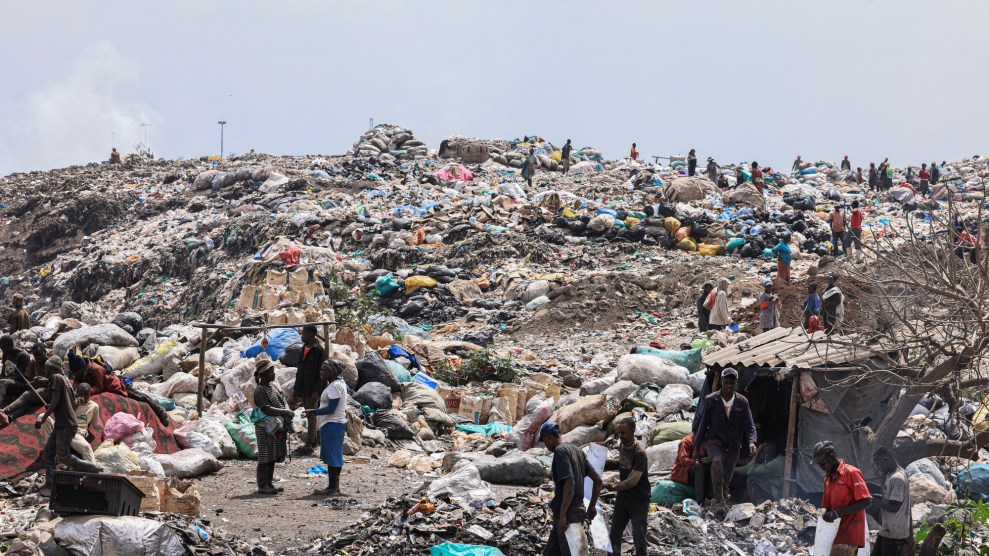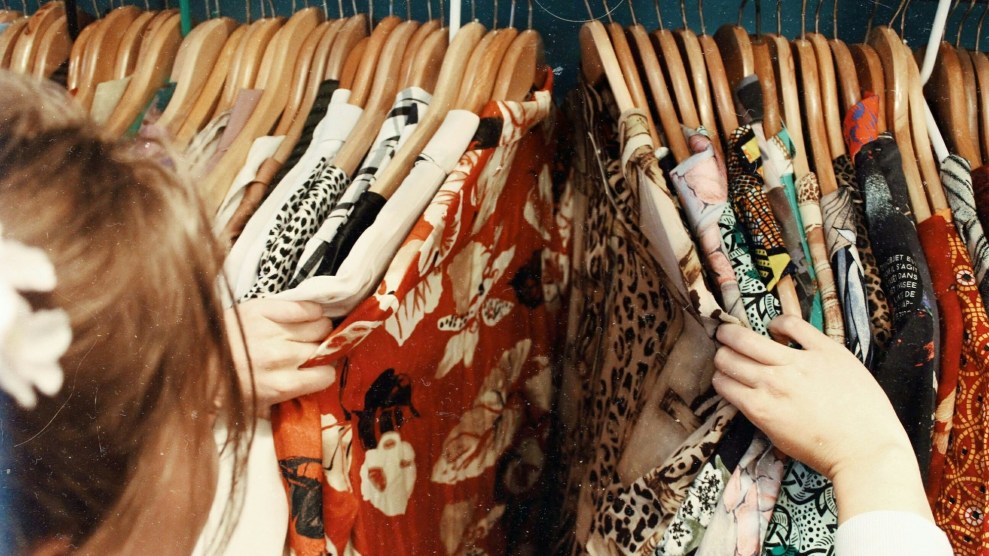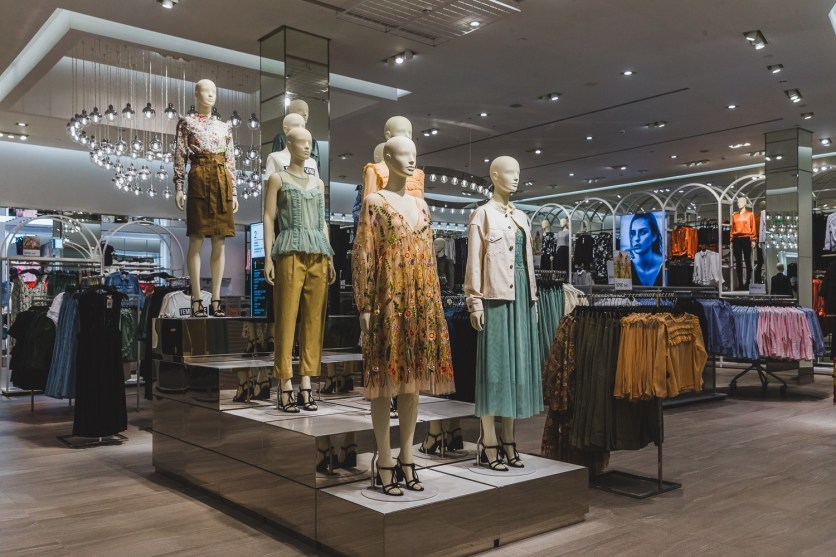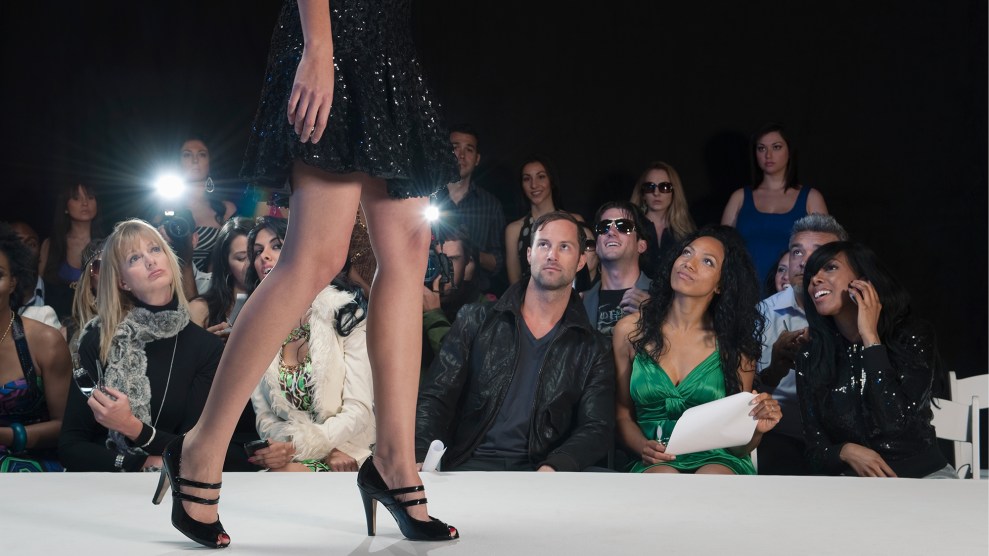
People sort through textile and plastic waste at the Dandora dumpsite, one of the largest landfills in East Africa. Allan Muturi/SOPA Images/LightRocket/Getty
This story was originally published by the Guardian and is reproduced here as part of the Climate Desk collaboration.
Mary Fleming was on holiday in Kenya when she saw it: a mound of secondhand clothes heaped by a river, the pile so vast and unruly it was spilling into the water.
The sight shocked her. At home in Ireland she was a passionate shopper and bought a new outfit almost every weekend. Now, in East Africa, she was seeing the consequence of fast fashion and mass consumption.
A decade later Fleming, now 34, is leading a campaign to prevent waste by swapping, reusing, repairing and repurposing clothes under the inimitable exhortation: “Because secondhand is feckin’ grand.”
“In some communities there is still a stigma about secondhand clothes and not wanting to be seen to be poor. We’re trying to change perceptions.”
She is the founder of Change Clothes, a nonprofit that hosts a swap shop in Dublin and runs pop-up outlets and workshops across Ireland. It lets people rent, exchange and buy used clothes and gives tutorials in mending and upcycling frayed garments.
“Most people wouldn’t know how to patch a hole. Once they figure it out they’re delighted with themselves,” says Fleming. “It’s so simple it’s criminal that it’s not better known.”
Change Clothes outgrew its base in Crumlin, west Dublin, and this month moved to new premises in the city center. “So many people were coming, we just needed more space,” says Fleming, who was still unpacking and sorting shoes and fabrics at the Thomas Street hub. The nonprofit also runs night markets and workshops in making Halloween costumes, Christmas baubles, and wreaths.
“This has grown really quickly so who knows where we will be in a few years. There is an appetite for change, an opportunity for change.” Fleming points to rolls of brightly coloured textiles stacked in a corner. “An underground network of textile freaks alerted me to a dump that had brand new rolls of fabric—it was heading for a landfill.”
Change Clothes is a mecca for the converted but Fleming’s goal is to reach people who trash old or unwanted clothes and trek to Zara, Next, the Gap and other outlets to replenish their wardrobe. “In some communities there is still a stigma about secondhand clothes and not wanting to be seen to be poor. We’re trying to change perceptions. There is a lot of work to be done.”
Enticing people into a swap-shop can be a “great gateway drug” that introduces them to wider possibilities of reusing and repairing garments, she says.
Fleming and her team of two part-time staff and a dozen or so volunteers have three categories: clothes in very good condition, clothes that “need help” and clothes at the end of their life.
For a €5 ($5.50) fee, people with garments in the first category can book a 30-minute slot at Change Clothes, obtain tokens for their donations—the better the condition or brand, the more tokens—and then use the tokens to select items from the shop’s racks.
Her first pop-up swap shop was such a hit she organized more, using her parents’ garage for storage, which Fleming still does. “They’ve been very patient, God love them.”
Alternatively you can rent an item, which must be returned clean, for about €10 ($11) per week. Last year, Fleming added her wedding dress, a sequin gown, to the rental racks. She had bought it online, her first such purchase in years, after her first choice, a secondhand dress, did not fit properly.
Surplus clothing in good condition is donated to refugee centres and assisted living accommodations.
Fleming’s team crisscrosses Ireland visiting university campuses, libraries, and community centres to give lessons in repairing or repurposing damaged or worn clothes. People’s eyes light up when they discover they can do basic tailoring, she says. “It can be incredibly creative and mindful. You’re not on your phone or laptop.”
Garments beyond rescue are chopped and cut and turned into something else such as banners or placemats.
The need for such skills is about to grow. From January, new EU rules will require member states to separate the collection of textiles for reuse and recycling, a directive that covers clothing, blankets, bed linen, curtains, hats, footwear, mattresses, and carpets.
The sight of that riverbank in Kenya redirected Fleming’s life. She quit her career in corporate marketing to work for nonprofits that promoted sustainability. Her first swap-shop, a weekend pop-up, was such a hit she organized more, using her parents’ garage for storage, which she still does. “They’ve been very patient, God love them.”
Fleming finds ideas and inspiration in Suay, a Los Angeles shop and recycling hub, and collaborates with the Northern Ireland charity Show Some Love Belfast, but she has no illusions about the challenge facing the movement.
Irish shopfronts are filled with Halloween outfits and decorations that will soon give way to winter and Christmas ware, then spring ware, summer ware and back to Halloween, part of a remorseless, globalized churn of production and consumption.
“If I spent every day thinking about what we’re up against I don’t think I’d bother. I want to focus on the change that is possible,” says Fleming. Garment by garment she will spread the message: Secondhand is feckin’ grand.















